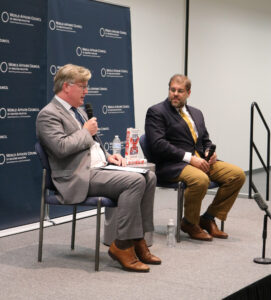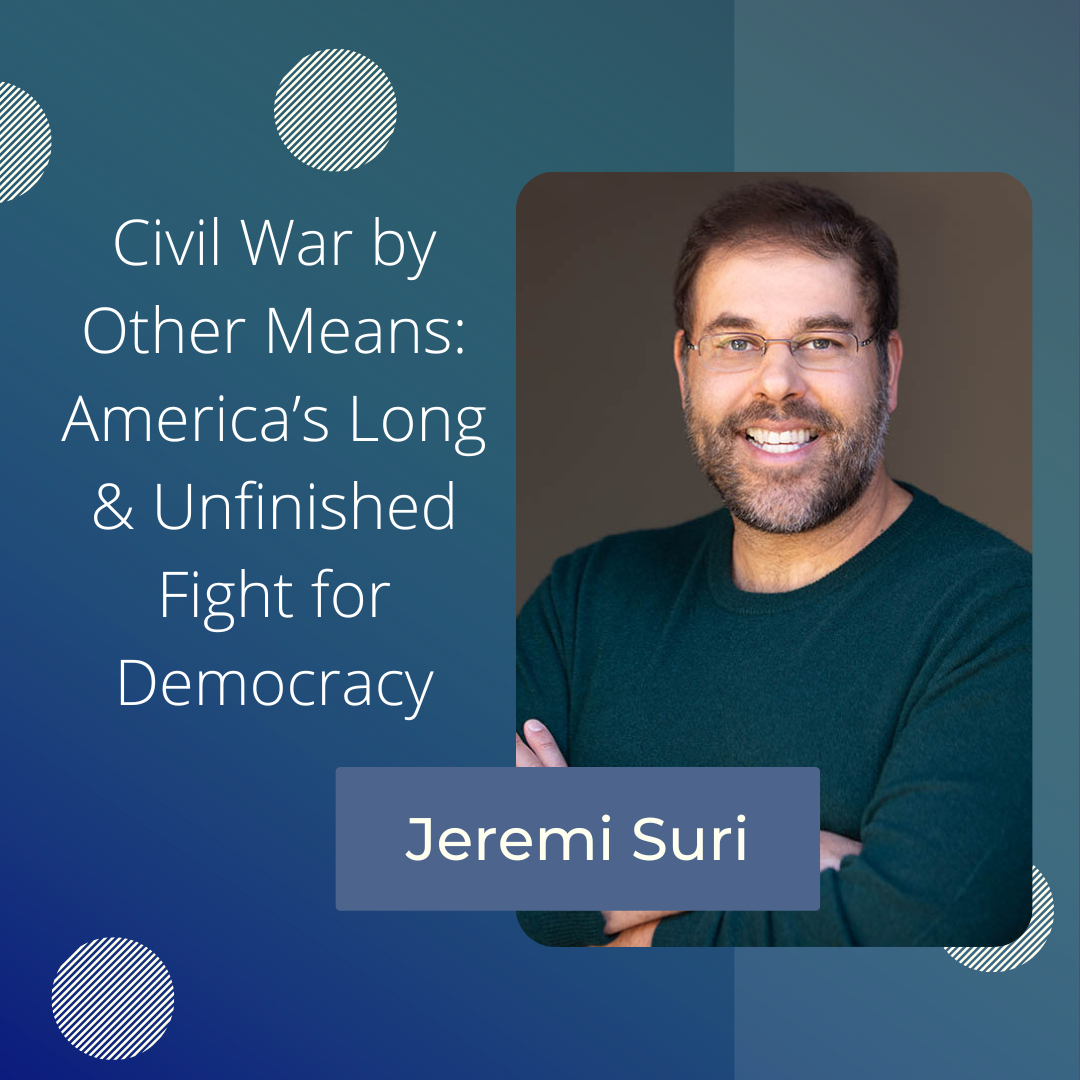Civil War by Other Means: A Conversation with Dr. Jeremi Suri about Division in America and its Historical Origins
“The problems we have are fixable” – Dr. Jeremi Suri
In every city that Dr. Jeremi Suri has visited to promote his new book, Civil War by Other Means: America’s Long and Unfinished Fight for Democracy, he has asked his audience if anyone sees the last five or six years as shocking for this country. And in every city, everyone in the audience has raised their hands in affirmation.
It is no secret that the last several years have been marred by conflict and division. Everyone in the US can see the country drifting apart, regardless of their political orientation. This is the reason that Dr. Suri wrote his new book: it is important, in his words, to analyze “the subterranean elements…influencing where we are today”. History often provides valuable insights into contemporary issues, which is what Dr. Suri deftly demonstrates.
The World Affairs Council of Greater Houston was proud to host Dr. Jeremi Suri for a discussion regarding his book and the rampant division in the US. An account of that discussion follows.

The Echoes of the Past
History presents us with many lessons. For example, our legitimacy and role in foreign policy are shaped by the cleanliness of our own house; that is, we need to clean up our act at home to be effective and respected on the global stage. Dr. Suri points to the example of the days of Civil Rights in the 1950’s: our attempts to push reform abroad were not taken seriously when we were segregating our own citizens. Instances that demonstrate we can rise above improve our public image: this was especially true with Brown v. Board of Education (1954), which ruled against the “separate but equal” justification for segregation. It was a sign to the rest of the world that we could be taken seriously once more.
The same rings true today. Images of January 6th, 2021, come to mind for the rest of the world when we push for a democratic transition of power abroad. Bolsonaro and his supporters in Brazil are less likely to take our warnings into account when we have suffered our own struggles with a peaceful transition. However, moments that prove we can overcome our strife serve as a boost for our public image. The eventual transition of power and the endurance of American democracy proved to the world that we can overcome.
Dr. Suri discussed the historical underpinnings of January 6th – a clear picture of American division – in depth. He referred to the historical use of violence and insurgency as political motivators and methods to achieve personal goals. One example is the assassination of President Lincoln in 1865, which is where his book begins. John Wilkes Booth was not a lone wolf, but rather a part of a complex insurgency network that only grew following the assassination. Movements that erupted from this network include the KKK, which President Grant attempted to stem. Grant’s anti-KKK legislation was, in fact, used to prosecute participants in the events of January 6th.
The Positives
Dr. Suri is adamant that there is always hope. History often paints the negative side of humanity in its pictures of the past, but if you look past the large brushstrokes, there are testaments to human strength and virtue. For example, the Civil War saw not only those who sought to divide the country and enslave others but also those who were willing to stand up and fight for change. Many formerly enslaved individuals were the pictures of courage, but there were also many white Americans who were strong allies and demonstrated a willingness to lend an open ear.
In addition, institutions often offer opportunities. For example, Dr. Suri spoke about the military and the change it can bring. One example is the learning curve of President Grant in the Civil War, who entered the military as a man who looked down on slaves but left calling them “worthwhile citizens”. This change of heart was influenced by the slaves who escaped when they knew the Union Army was near: the military was desperate for more men, and the slaves were desperate for freedom. Seeing their bravery on the battlefield and their humanity off the battlefield changed Grant, influencing his future tenure as president.
The same opportunities from the military echo throughout history. Another example Dr. Suri mentioned was the GI Bill following World War Two, which presented thousands of Americans with the opportunity to attend school where they otherwise would not have. This also enabled targets of discrimination more freedom than they had in the past, such as Jewish Americans. New opportunities for Jewish individuals came after the war, not just from collective guilt over the Holocaust but also from the opportunities that came from the military.
Confronting the Past
Dr. Suri emphasized that confronting the past is critical for the future. If you do not acknowledge the ugly side of history, you are doomed to repeat it. He mentioned the German conviction in facing their Nazi ghosts but emphasized that it was not always that way: it took the country a long time to come to terms with what had happened. Similarly, the famous case of the South African Truth and reconciliation commissions following the days of apartheid are respected for their commitment to justice, but they too had their flaws. These cases show that even if it does not seem so now, the US can still learn from history and apply its lessons to the present. It is vital that we do so, in Dr. Suri’s words. And the best path to this process of healing comes from educating the public, which serves as another reason for Dr. Suri’s book and subsequent discussions around the country.
Lessons and Solutions
The main lessons that Dr. Suri emphasized in his talk include the importance of our democracy and learning from history. He called democracy the “most important element of our foreign policy”, demonstrating that it is what separates us from other global powers and grants us the most respect and legitimacy. It is therefore paramount to preserve it.
In addition, he spoke on more than one occasion about the importance of paying attention to both the good and the bad of our country and its history. This is manifested through Dr. Suri’s belief that there are no victims or perpetrators, but simply people. Everyone is both victim and perpetrator, either because they are driven by circumstance or because they simply see themselves that way. The duality of individuals serves as a microcosm for history itself, where there are both positives and negatives.
One suggestion Dr. Suri spoke of in his talk for healing our wounds included a new amendment to the Constitution. He proposed an amendment to enshrine voters’ rights, written to mimic the language of the Bill of Rights. He mentioned how uncontroversial it was, where everyone in his audience around the country have agreed that it would be a good idea. Taking large steps like this, but also small steps in starting local conversations, is what can slowly heal our country.
This change can come, Dr. Suri says, by regarding our country like a doctor would a sick patient or a parent would their child. Doctors diagnose problems and treat them: we must diagnose our problems, such as the tumors of partisanship, white supremacy, and voter suppression, and find treatments for them. Parents love their children but teach them where they need to improve: we must love our country but not be blind to the ways that it can better itself. This, in Dr. Suri’s view, is the most patriotic thing one can do.
There is hope for the future of our country. It is not unreasonable to be an optimist; in fact, it is perfectly acceptable. Dr. Suri himself is an optimist. As a historian, he sees our country’s merits and believes in our prospects. The key is recognizing our faults. “The gift of the moment,” he says, “is knowing we are sick.” Only then can we see real progress.
By Emily Combs
About Dr. Suri:
Dr. Jeremi Suri, Ph.D., is a professor at the University of Texas at Austin in the History Department and the LBJ School of Public Affairs. He is also an author for many important news outlets, including The New York Times, The Washington Post, Foreign Affairs, and The Houston Chronicle. A popular public lecturer, he has also made many appearances on radio and television to inform listeners about the importance of history and foreign policy. His new book, Civil War by Other Means: America’s Long and Unfinished Fight for Democracy, explores the Civil War and the Reconstruction Era and how their questions of equality and unity echo in the struggles of today. Other books by Dr. Suri include The Impossible Presidency: The Rise and Fall of America’s Highest Office, Henry Kissinger and the American Century, and Foreign Policy Breakthroughs: Cases in Successful Diplomacy (with Robert Hutchings).
His innovative work has gained him important recognition. He received both the Pro Bene Meritis Award for Contributions to the Liberal Arts and the UT Austin President’s Associates Teaching Excellence Award in 2018. In addition, he was named one of the “Top Young Innovators” of the US in the arts and sciences in 2007.

